|
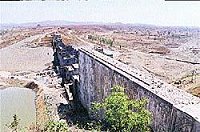 Maan Dam 4 Maan Dam 4
• Height: 52 metres
• Construction: 1992-
• Submergence: 865 hectares
• Villages: 17
• People displaced: 5,000
• Irrigated area: 19,200 hectares
NBA action:
1997: Oustees begin mobilization
1998: Task Force review
1999: 26-day fast leads to stoppage
2000: Work restarts without resettlement
2001: Action under threat of submergence
|
|
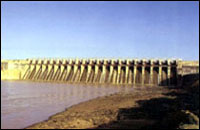 Bargi Dam 4 Bargi Dam 4
• Construction: 1984-90
• Submergence: 26,797 hectares
• Villages: 162 (anticipated: 90)
• People displaced: 114,000 (anticipated: 70,000)
• Proportion tribal: 43%
• Irrigated area: 8,000 hectares (anticipated: 437,000)
NBA action:
1992: First mass action for just resettlement
1993: 55-day sit-in as waters rise
1994: Mass action in Bhopal
1997: Sit-in and hunger strike
2001: Many issues still outstanding
|
|
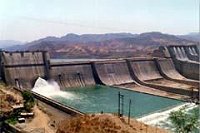 Sardar Sarovar Project 4 Sardar Sarovar Project 4
• Final height: 139 metres
• Current height: 90 metres
• Construction: 1987-
• Reservoir length: 214 km
• Submergence: 37,690 hectares
• Villages: 245
• Canal network: 75,000 km
• People displaced: 200,000
• Proportion tribal: 56%
• Irrigated area: 1.8 million hectares
NBA action:
1985: Mobilization begins in tribal belt
1988: Total opposition to dam
1989: Marches, sit-ins, fasts, arrests
1993: World Bank withdraws
1993: ‘Sacrifice in water’ threat
1994: National level review
1994: Petition in Supreme Court
1995: Construction halts
2000: Supreme Court judgement
|
|
Maheshwar dam 4
• First privately constructed dam in India
• Anticipated finance: US and Germany
• Height: 36 metres
• Purpose: Hydroelectricity
• Construction: 1996-
• Submergence: 5,697 hectares.
• Villages: 61
• People displaced: 35,000
NBA action:
1998: First capture of dam-site
1998: Task Force review
1999: Sit-in and 26-day fast in Bhopal
1999: US and German companies withdraw
2000: German Government refuses loan guarantee
2000: US company Ogden withdraws
|
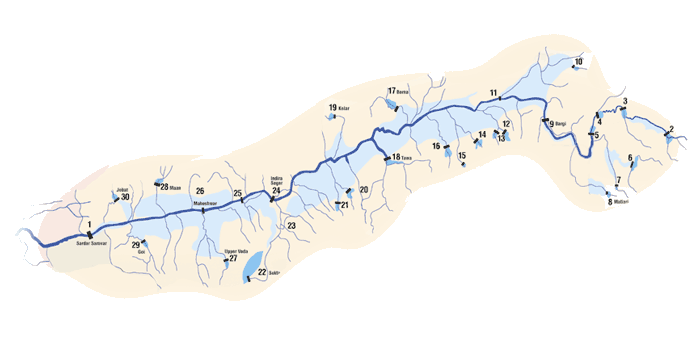
|
Projects under construction:
1 Sardar Sarovar 24 Indira Sagar 26 Maheshwar
27 Upper Veda 28 Maan 29 Goi 30 Jobat
Projects completed:
8 Matiari 9 Bargi 17 Barna 18 Tawa
19 Kolar 22 Sukta
|
Dam after dam
India has over 4,000 large dams. Three-quarters of India’s dams are in the three states of Gujarat, Maharashtra and Madhya Pradesh and most are for irrigation. The figures show the rapid acceleration of dam construction through the last century.
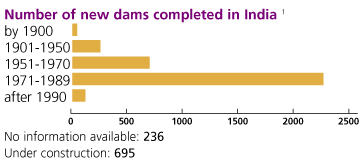
The Narmada Bachao Andolan (NBA) 3
• Is a people’s movement which started in 1985
• Leadership is provided by Medha Patkar and other activists, unsalaried
• Receives no funds from outside India
• Employs tactics that are entirely non-violent; sit-ins, fasts, rallies, marches
• Is a founder member of the National Alliance of People’s Movements
• Has attracted an international network of support
The achievements of the Narmada Bachao Andolan include:
• Exit of the World Bank from Sardar Sarovar in 1993
• Halt of Sardar Sarovar construction 1994-99
• Withdrawal of foreign investors from Maheshwar dam 1999-2001
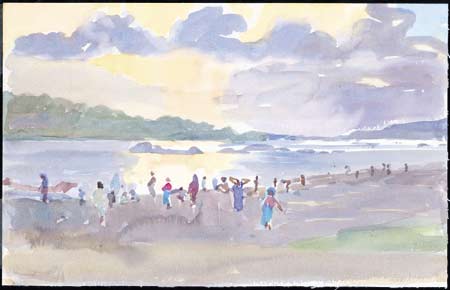
Pros and cons 2
• Indian food production rose from 50 to 200 million tonnes 1950-1997; two-thirds of increase from irrigation
• Data does not make clear what proportion of the increase was contributed by large dams: estimated 10%; Government claims 30%
• Before 1978 all dams built without an environmental impact assessment (EIA). EIA became statutory only in 1994
• Estimates of those displaced by large dams in India in the last 50 years vary from 21 to 56 million people
• 40% of those displaced are adivasis (tribal people)
• Less than 50% of people displaced by large projects are rehabilitated
• Construction occurs under the Official Secrets Act; access is denied, information is withheld, ‘participation’ is non-existent
• The costs of dams are systematically underestimated and their benefits are inflated
• Accepted cost-benefit ratio for large dams is not met in 8 out of 10 cases
• Heavy silting shortens the life of many dams
• There have been 17 cases of earthquake tremor induced by large reservoirs in India

1 National Register of Large Dams — Central Water Commission 1994, New Delhi.
2 India Country Study, prepared for World Commission on Dams,
2000 and Mid-Term Appraisal, Indian Planning Commission, 2000.
3 Friends of the River Narmada,  www.narmada.org www.narmada.org
4 As above, plus The River and Life: People’s Struggle in the Narmada Valley,
Sanjay Sangvai, Earthcare Books, 2000
|
![]()






